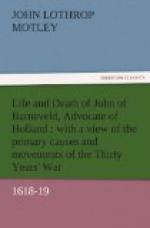As the political tendencies, so too the religious creed and observances of the English Puritans were identical with that of the Contra-Remonstrants, whom King James had helped to their great triumph. This was not very difficult to prove. It so happened that there were some English Puritans living at that moment in Leyden. They formed an independent society by themselves, which they called a Congregational Church, and in which were some three hundred communicants. The length of their residence there was almost exactly coeval with the Twelve Years’ Truce. They knew before leaving England that many relics of the Roman ceremonial, with which they were dissatisfied, and for the discontinuance of which they had in vain petitioned the crown—the ring, the sign of the cross, white surplices, and the like—besides the whole hierarchical system, had been disused in the Reformed Churches of France, Switzerland, and the United Provinces, where the forms of worship in their view had been brought more nearly to the early apostolic model. They admitted for truth the doctrinal articles of the Dutch Reformed Churches. They had not come to the Netherlands without cause. At an early period of King James’s reign this congregation of seceders from the establishment had been wont to hold meetings at Scrooby in Nottinghamshire, once a manor of the Archbishop of York, but then the residence of one William Brewster. This was a gentleman of some fortune, educated at Cambridge, a good scholar, who in Queen Elizabeth’s time had been in the service of William Davison when Secretary of State. He seemed to have been a confidential private secretary of that excellent and unlucky statesman, who found him so discreet and faithful as to deserve employment before all others in matters of trust and secrecy. He was esteemed by Davison “rather as a son than a servant,” and he repaid his confidence by doing him many faithful offices in the time of his troubles. He had however long since retired from connection with public affairs, living a retired life, devoted to study, meditation, and practical exertion to promote the cause of religion, and in acts of benevolence sometimes beyond his means.
The pastor of the Scrooby Church, one John Robinson, a graduate of Cambridge, who had been a benefited clergyman in Norfolk, was a man of learning, eloquence, and lofty intellect. But what were such good gifts in the possession of rebels, seceders, and Puritans? It is needless to say that Brewster and Robinson were baited, persecuted, watched day and night, some of the congregation often clapped into prison, others into the stocks, deprived of the means of livelihood, outlawed, famished, banned. Plainly their country was no place for them. After a few years of such work they resolved to establish themselves in Holland, where at least they hoped to find refuge and toleration.




